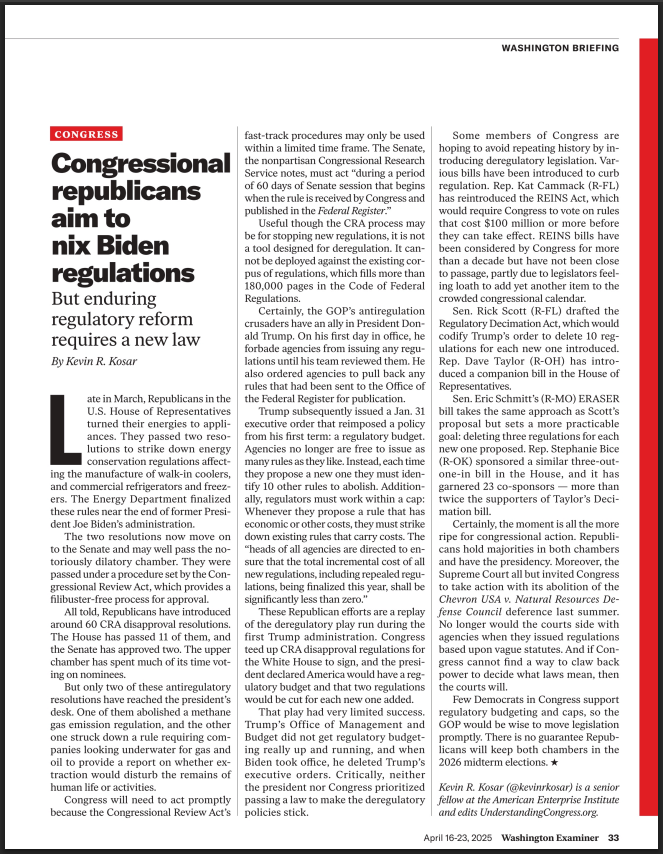
Late in March, Republicans in the U.S. House of Representatives turned their energies to appliances. They passed two resolutions to strike down energy conservation regulations affecting the manufacture of walk-in coolers, and commercial refrigerators and freezers. The Energy Department finalized these rules near the end of former President Joe Biden’s administration.
The two resolutions now move on to the Senate and may well pass the notoriously dilatory chamber. They were passed under a procedure set by the Congressional Review Act, which provides a filibuster-free process for approval.
All told, Republicans have introduced around 60 CRA disapproval resolutions. The House has passed 11 of them, and the Senate has approved two. The upper chamber has spent much of its time voting on nominees.
But only two of these antiregulatory resolutions have reached the president’s desk. One of them abolished a methane gas emission regulation, and the other one struck down a rule requiring companies looking underwater for gas and oil to provide a report on whether extraction would disturb the remains of human life or activities.
Congress will need to act promptly because the Congressional Review Act’s fast-track procedures may only be used within a limited time frame. The Senate, the nonpartisan Congressional Research Service notes, must act “during a period of 60 days of Senate session that begins when the rule is received by Congress and published in the Federal Register.”
Useful though the CRA process may be for stopping new regulations, it is not a tool designed for deregulation. It cannot be deployed against the existing corpus of regulations, which fills more than 180,000 pages in the Code of Federal Regulations.
Certainly, the GOP’s antiregulation crusaders have an ally in President Donald Trump. On his first day in office, he forbade agencies from issuing any regulations until his team reviewed them. He also ordered agencies to pull back any rules that had been sent to the Office of the Federal Register for publication.
Trump subsequently issued a Jan. 31 executive order that reimposed a policy from his first term: a regulatory budget. Agencies no longer are free to issue as many rules as they like. Instead, each time they propose a new one they must identify 10 other rules to abolish. Additionally, regulators must work within a cap: Whenever they propose a rule that has economic or other costs, they must strike down existing rules that carry costs. The “heads of all agencies are directed to ensure that the total incremental cost of all new regulations, including repealed regulations, being finalized this year, shall be significantly less than zero.”
These Republican efforts are a replay of the deregulatory play run during the first Trump administration. Congress teed up CRA disapproval regulations for the White House to sign, and the president declared America would have a regulatory budget and that two regulations would be cut for each new one added.
That play had very limited success. Trump’s Office of Management and Budget did not get regulatory budgeting really up and running, and when Biden took office, he deleted Trump’s executive orders. Critically, neither the president nor Congress prioritized passing a law to make the deregulatory policies stick.
Some members of Congress are hoping to avoid repeating history by introducing deregulatory legislation. Various bills have been introduced to curb regulation. Rep. Kat Cammack (R-FL) has reintroduced the REINS Act, which would require Congress to vote on rules that cost $100 million or more before they can take effect. REINS bills have been considered by Congress for more than a decade but have not been close to passage, partly due to legislators feeling loath to add yet another item to the crowded congressional calendar.
Sen. Rick Scott (R-FL) drafted the Regulatory Decimation Act, which would codify Trump’s order to delete 10 regulations for each new one introduced. Rep. Dave Taylor (R-OH) has introduced a companion bill in the House of Representatives.
Sen. Eric Schmitt’s (R-MO) ERASER bill takes the same approach as Scott’s proposal but sets a more practicable goal: deleting three regulations for each new one proposed. Rep. Stephanie Bice (R-OK) sponsored a similar three-out-one-in bill in the House, and it has garnered 23 co-sponsors — more than twice the supporters of Taylor’s Decimation bill.
Certainly, the moment is all the more ripe for congressional action. Republicans hold majorities in both chambers and have the presidency. Moreover, the Supreme Court all but invited Congress to take action with its abolition of the Chevron USA v. Natural Resources Defense Council deference last summer. No longer would the courts side with agencies when they issued regulations based upon vague statutes. And if Congress cannot find a way to claw back power to decide what laws mean, then the courts will.
Few Democrats in Congress support regulatory budgeting and caps, so the GOP would be wise to move legislation promptly. There is no guarantee Republicans will keep both chambers in the 2026 midterm elections.
Kevin R. Kosar (@kevinrkosar) is a senior fellow at the American Enterprise Institute and edits UnderstandingCongress.org. This story previously appeared in the Washington Examiner.
Stay in the know about our news and events.